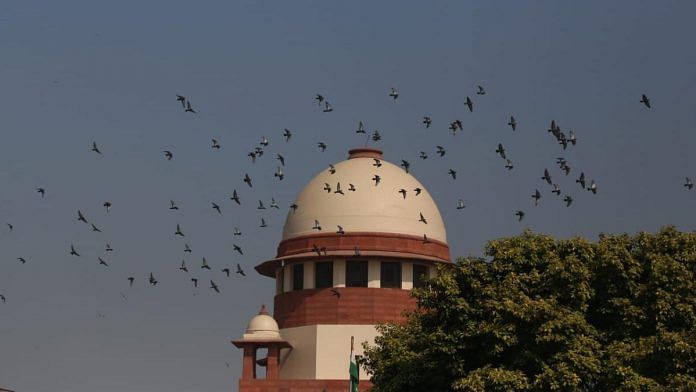New Delhi: Supreme Court judge Justice D.Y. Chandrachud has written to the chief justices of 25 high courts, seeking their feedback on the model rules framed for live-streaming of court proceedings.
The rules for live telecast of hearings in high courts and trial courts were finalised by a panel of four judges — an e-committee led by Justice Chandrachud — that was set up in November 2020.
In 2018, a three-judge bench led by then Chief Justice of India Dipak Misra had first recommended broadcasting SC hearings live, in the Swapnil Tripathi case.
In a judgment delivered last month, the apex court reiterated the need for telecast of court proceedings, saying “livestreaming of proceedings is to enhance public participation in the dispensation of justice”.
Justice Chandrachud’s letter has asked the chief justices to respond as soon as possible, preferably not later than 30 June. The model rules have also been sent to the Department of Justice, Niti Aayog and the National Judicial Academy for their inputs and suggestions.
A senior apex court official, in the know of the developments, told ThePrint that the comprehensive rules will guide high courts and trial courts to start live-telecast of court hearings.
“This does not make it mandatory for High Courts to start live broadcasting. That decision has been left to the discretion of concerned chief justices,” the official added.
The rules specify the type of cases that would fall in the exception category and also permits archiving the proceedings in case they are not telecast. A litigant can also avail a copy of the archived proceedings under the rules, but subject to a court order.
Also read: This is how Madras HC judge, who claimed he wasn’t ‘woke’, plans to ensure LGBTs are protected
HCs open to live proceedings
Justice Chandrachud’s letter comes in the backdrop of two high courts — Allahabad and Madhya Pradesh — seeking a response last week from their respective administration on steps taken to implement the SC’s 2018 judgment on live broadcast of court hearings. This was in response to separate PILs filed before the two courts.
In October 2020, the Gujarat High Court became the first to broadcast its proceedings live on a YouTube channel. So far it is restricted only to the chief justice’s court.
The Karnataka High Court followed suit last week and began live streaming proceedings of the chief justice’s court.
While HCs have taken the lead, the top court has remained non-committal on following its own 2018 verdict.
However, at the launch of an application for media persons to access virtual court hearings, Chief Justice of India N.V. Ramana said he has been “seriously contemplating live telecast of apex court hearings in some important matters”.
Rules don’t allow telecast of all cases
The model rules allow exclusion of sensitive matters from live-streaming: cases of matrimonial disputes, sexual offences, those concerning gender-based violence against women, registered under Protection of Children from Sexual Offences Act, 2012 (POCSO) and the Juvenile Justice (Care and Protection of Children) Act, 2015.
The rules also allow a presiding judge or the bench to stop live-streaming of cases, which may provoke enmity among communities and could result in a breach of law and order.
However, this would be subject to a written order in which reasons against live-telecast of the case will be recorded.
“The final decision as to whether or not to allow the Live-streaming of the Proceedings or any portion thereof will be of the Bench, however, the decision of the Bench will be guided by the principle of an open and transparent judicial process. The decision of the Bench shall not be justiciable,” read the rules, uploaded on the Supreme Court e-committee’s website.
Parties can object to live streaming of their case and this can be done at the time of institution of the case or later as well. Before the commencement of any proceeding, the court shall inform the parties involved about the proceedings being live-streamed, the rules clarify.
Also read: ‘Abuse of law, defective’ — What Delhi HC said as it dismissed Juhi Chawla’s lawsuit on 5G
Data to be archived for six months
According to the rules, in cases where the proceedings are not live-streamed, recordings shall be maintained for usage by the court. However, access to the recording of the testimony of witnesses will not be given till the evidence is recorded in its entirety.
Transcription of the recordings would be made available to the advocate or litigant-in-person and in case the litigant-in-person is also a witness in the matter, then the bench will decide the stage at which access to the recordings of the testimonies of other witnesses can be had.
In criminal matters, the court has to make sure that the anonymity of the victims and witnesses is maintained in the recordings via dummy names, face-masking, pixelation and/or electronic distortion of voice.
Recordings may be uploaded, wholly or in part, on the courts’ website or made available on other digital platforms, as directed by the court.
The recordings will be archived and this data “should ordinarily be retained by the Court for at least six months”, subject to special directions issued by the court.
Also read: ‘Criticism of govt not sedition’: What Kedar Nath ruling that SC quoted in Vinod Dua case says



